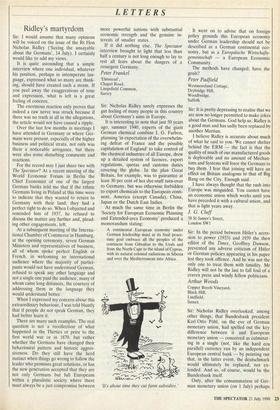Sir: Nicholas Ridley surely expresses the gut feeling of many
people in this country about Germany's aims in Europe.
It is interesting to note that just 50 years ago, summer 1940, experts of the giant German chemical combine I. G. Farben, planning 'in expectation of the overwhelm- ing defeat of France and the possible capitulation of England' to take control of the chemical industries of all Europe, drew up a detailed system of licences, export regulations, quotas and customs duties covering the globe. In the plan Great Britain, for example, was to guarantee at least 30 per cent of her dye-stuff turn-over to Germany, but was otherwise forbidden to export chemicals to the European conti- nent, America (except Canada), China, Japan or the Dutch East Indies.
At much the same time in Berlin the `Society for European Economic Planning and Extended-area Economy' produced a memorandum stating:
A continental European economy under German leadership must as its final peace- time goal embrace all the peoples of the continent from Gibraltar to the Urals and from the North Cape to the island of Cyprus, with its natural colonial radiations in Siberia and over the Mediterranean into Africa.
'It's about time they cut farm subsidies.' It went on to advise that on foreign policy grounds this European economy under German leadership should not be described as a German continental eco- nomy, but as a Europaische Wirtschafts- gemeinschaft — a European Economic Community.
The methods have changed; have the goals?
Peter Padfield
Westmoreland Cottage, Drybridge Hill, Woodbridge, Suffolk


















































 Previous page
Previous page